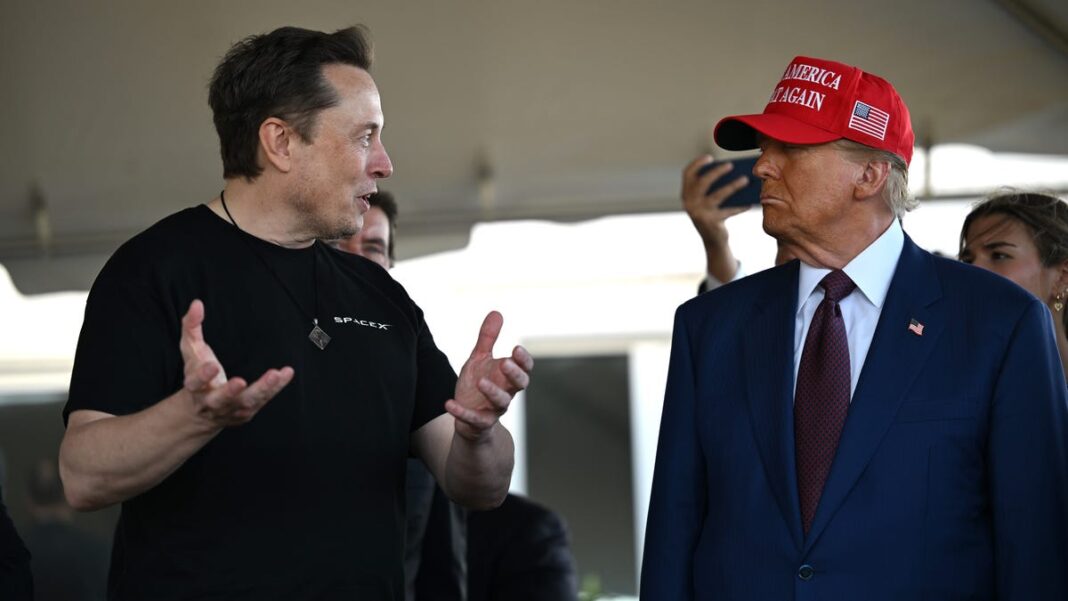Comparing the Economic Perspectives of Trump and Musk
Elon Musk, who has been chosen by President-elect Donald Trump to lead the new Department of Government Efficiency, might offer a unique viewpoint on economic policies in the upcoming administration.
Trump’s “first buddy” has begun to express his thoughts on the economy, which sometimes conflict with the president-elect’s views. Musk has remained close to Trump ever since Trump’s win over Vice President Kamala Harris.
The two formed a fast friendship after Musk, the CEO of SpaceX and Tesla, endorsed Trump. Using his resources and connections, Musk helped fundraise for Trump’s campaign. Following Trump’s victory, he was suggested to head a governmental department aimed at enhancing efficiency, which could potentially benefit Musk’s cryptocurrency interests.
As Musk’s companies gain considerable value and influence in Washington is expected post-Trump’s inauguration in January, here’s a look at how their economic ideologies line up:
Tariff Policies: Increase or Decrease?
High costs significantly impacted Trump’s reelection bid, as inflation emerged as a primary concern among voters, highlighting the importance of economic issues in polls.
On the campaign trail, Trump committed to a new trade policy featuring increased tariffs on imports to bring back manufacturing jobs to America, despite warnings from some economists that these measures could lead to higher prices for consumers.
Recently, Musk openly disagreed with Trump by endorsing the Argentinian president’s decision to reduce import taxes in a social media post, labeling it a “good move.”
Streamlining Costs and Reducing Bureaucracy
Musk and Trump largely share a perspective on reducing federal expenditure. Trump has appointed Musk to spearhead the new “Department of Government Efficiency” alongside fellow tech entrepreneur Vivek Ramaswamy.
In announcing their new roles, Trump indicated that the two would work collaboratively with the White House and the Office of Management and Budget to achieve significant structural reforms aimed at slashing trillions in spending.
In a recent op-ed in the Wall Street Journal, Musk and Trump outlined their intentions to eliminate regulations and initiate sweeping layoffs of federal employees.
Identifying the Right Economic Adviser
Musk may have played a role in influencing Trump’s selection of Howard Lutnick as commerce secretary, who will guide economic development efforts and empower the president.
Lutnick, also a billionaire, serves as the co-chair of Trump’s transition team, leads the financial services firm Cantor Fitzgerald, and is a cryptocurrency enthusiast. Musk suggested in a recent social media post that Lutnick would be a more fitting choice for Treasury secretary than Scott Bessent, another contender and hedge fund manager.
Musk critiqued Bessent as a “business-as-usual choice,” whereas he believed Lutnick would help to implement significant changes. Just three days later, Trump announced Lutnick’s nomination for commerce secretary.
Shared Enthusiasm for Cryptocurrency
Both Trump and Musk appear to align on cryptocurrency matters. Trump accepted cryptocurrency donations during his campaign and promoted himself as a pro-crypto candidate. His social media platform, Truth Social, is negotiating to acquire the crypto trading firm Bakkt.
Musk has long been associated with Dogecoin, a meme-based cryptocurrency that gained significant value following Trump’s election. He stated earlier this year on social media that he owned “a bunch” of Dogecoin. If he still holds a substantial amount of it, he stands to gain financially from its appreciation after Trump’s win.
Recently, Musk has been promoting a cryptocurrency commonly known as “doge,” in addition to his new position in Trump’s suggested cost-reduction department, which is abbreviated as “DOGE.” He has shared AI-generated visuals and memes showcasing the coin’s mascot, a Shiba Inu dog, across social media platforms.
When is the right time for the U.S. to switch to sustainable energy?
Trump and Musk seem to have differing opinions on how urgent the threat of climate change is. Trump advocates for “drill baby drill” as a strategy to boost the economy, arguing that reducing energy costs would also lower other prices.
“You can’t really avoid [fossil fuels] right now. Maybe in the future you could. But I’ve heard estimates that we might have anywhere from 100 to 500 years left,” Trump stated during an August conversation with Musk on X Spaces.
Musk, whose company Tesla produces electric vehicles, slightly countered this view. He mentioned that climate change is a genuine issue that the U.S. should tackle within the next 50 to 100 years.
During the same dialogue, Trump referred to nuclear power as a “big problem.” Musk responded by asserting that nuclear energy is undervalued and often confused with the notion of nuclear conflict. Trump countered by suggesting that nuclear power suffers from “bad branding” and should be given a new name.

